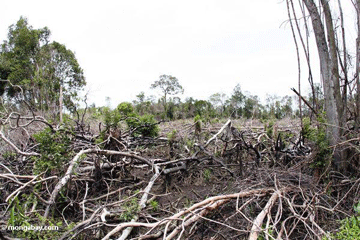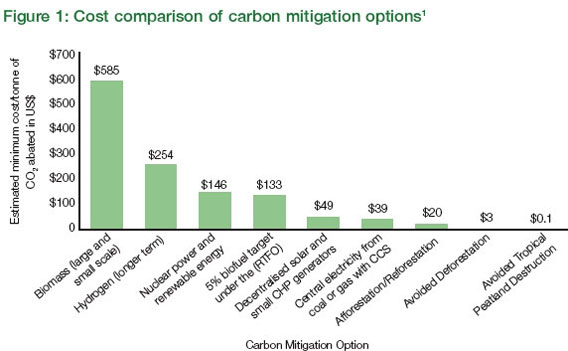Biofuels up to 200 times more expensive than forest conservation for global warming mitigation
Biofuels 200 times more expensive than forest conservation for global warming mitigation
mongabay.com
August 27, 2008
The British government should end subsidies for biofuels and instead use the funds to slow destruction of rainforests and tropical peatlands argues a new report issued by a U.K.-based think tank.
The study, titled “The Root of the Matter” and published by Policy Exchange, says that “avoided deforestation” would be a more cost-effective way to address climate change, since land use change generates more emissions than the entire global transport sector and offers ancillary benefits including important ecosystem services.
“Preventing deforestation, promoting afforestation/reforestation and stopping peatland destruction are some of the cheapest and most effective ways of reducing global greenhouse gas (GHG) emissions,” the authors write. “We propose the introduction of market mechanisms that can ensure investment is directed into these areas and a strategy to make this happen as quickly as possible.”
“The prevention of deforestation and peatland destruction requires no technological development and little capital investment. This method of reducing GHG emissions is dramatically cheaper than all other mitigation technologies currently available—as low as US$0.1 per tonne of CO2,” they continue.

Peat forest logging and draining in Borneo |
“The economics is startling — if developed countries spent the same amount of money on preventing deforestation and the destruction of peatlands as they do on biofuel subsidies (US$15 billion), this would halve the total costs of tackling climate change. In addition to this, the protection of these habitats yields a plethora of valuable eco-system services, particularly in the poorest countries.”
The report says that despite the benefits and the low costs, British government policy does not place any value on protecting forests and peatlands. Arguing that this is a mistake, the authors recommend a series of policy actions.
First and foremost, the report urges the British government to abandon its targets and subsidies for biofuels. Not only do biofuels distort food markets, they promote destruction of tropical forests and peatlands, resulting in greenhouse emissions. Further, biofuels are a costly and ineffective means for fighting climate change. The authors demonstrate this by comparing the cost and the emissions savings between potential avoided deforestation mechanisms and the U.K. government’s Renewable Transport Fuel Obligation. They find that the biofuel initiative will save 2.6-3 million tons of carbon dioxide per year at a cost of £550 million ($1 billion), while a similar investment in preventing deforestation and peatland destruction could result in avoided emissions of 40-200 million tons of CO2 per year or a 50 times greater amount of avoided emissions. The savings would be equivalent to 37 percent of all UK carbon dioxide emissions for 2005.

Cost comparison of carbon mitigation options. Biomass, hydrogen fuel cells, nuclear power, biofuels, solar, “clean coal” with carbon capture and sequestration (CCS), all fare poorly from an economic standpoint when compared with avoided deforestation and avoided tropical peat destruction. Courtesy of the “The Root of the Matter”. |
Beyond a moratorium on incentives for biofuels, the authors recommend supporting efforts to reduce peatland destruction in Southeast Asia, especially Indonesia, where large tracts of peatlands are being drained and cleared for the establishment of oil palm plantations. The authors say that because of the high levels of carbon storage in peatlands, reducing their destruction is “one of the lowest-hanging fruits of climate change mitigation.” The U.K. should exert political pressure on the drivers of deforestation while simultaneously offering financial carrots for reducing destruction. The report calls on the government to support capacity building — through financial support and technology transfer — in developing countries to prepare for avoided deforestation as well as seed-funding for pilot projects. The authors urge the establishment of a forest carbon market that would provide a “realistic price” for carbon that fully values the ecosystem services provided by healthy forests and provides a financing mechanism for conservation measures. The authors say credits should be generated both by reforestation and reducing deforestation and degradation and asks the British government to push for an international agreement that recognizes the role of avoided deforestation in future climate change mitigation.
“In the UK we can dramatically increase funding for forest and peatland projects domestically and with key partners, especially in Southeast Asia, as well as lobbying at an international level for the right global policies,” Ben Caldecott, editor of the report, was quoted as saying by BBC News. “All this can be done within our current budget, by ending wasteful and damaging biofuel subsidies.”
Related articles
 |
Markets could save rainforests: an interview with Andrew Mitchell
(8/17/2008) Markets may soon value rainforests as living entities rather than for just the commodities produced when they are cut down, said a tropical forest researcher speaking in June at a conservation biology conference in the South American country of Suriname. Andrew Mitchell, founder and director of the London-based Global Canopy Program (GCP), said he is encouraged by signs that investors are beginning to look at the value of services afforded by healthy forests.
Indonesia’s Riau bans destruction of rainforests and peatlands for palm oil
(8/15/2008) The Indonesian province of Riau on the island of Sumatra has pledged to stop destruction of its forests and carbon-rich peatlands in an effort to reduce carbon emissions from deforestation by 50 percent by 2009.
Investors seek profit from conserving rainforest biodiversity
(8/13/2008) An investment firm has launched the first tropical biodiversity credits scheme. New Forests, a Sydney, Australia-based company, has established the Malua Wildlife Habitat Conservation Bank in Malaysia as an attempt to monetize rainforest conservation. The “Malua BioBank” will use an investment from a private equity fund to restore and protect 34,000 hectares (80,000 acres) of formerly logged forest that serves as a buffer between biologically-rich forest reserve and a sea of oil palm plantations. The conservation effort will generate “Biodiversity Conservation Certificates”, the sales of which will endow a perpetual conservation trust and produce a return on investment for the Sabah Government and the private equity fund.
“Turtle carbon” could help protect rainforests and save endangered sea turtles
(8/12/2008) Using carbon credits to promote rainforest conservation could help protect endangered sea turtles in some parts of the world, argues a carbon finance expert.
New plan would pay tropical countries for saving forests, regardless of level of threat
(7/24/2008) Deforestation and forest degradation account for around a fifth of global carbon emissions from human activities, but new policy measures are focusing reducing such emissions as a cost-effective way to fight global warming. While the concept — known as REDD for “Reducing Emissions from Deforestation and Degradation” — has found wide support from politicians, scientists, and environmentalists, there are lingering concerns over how to compensate countries that have extensive forest cover and low rates of annual forest loss, since payments are based on historical deforestation rates. A new proposal seeks to get around this issue by factoring in all the terrestrial carbon in a tropical landscape — regardless of level of threat it faces — and packaging it as a tradable commodity.
 |
Carbon market could fund rainforest conservation, fight climate change
(5/19/2008) A mechanism to fund forest conservation through the carbon market could significantly reduce greenhouse emissions, help preserve biodiversity, and improve rural livelihoods, says a policy expert with the Woods Hole Research Center (WHRC) in Massachusetts. In an interview with mongabay.com, WHRC Policy Advisor and Research Associate Tracy Johns says that Reducing Emissions from Deforestation and Degradation (REDD), a proposed policy mechanism for combating climate change by safeguarding forests and the carbon they store, offers great potential for protecting tropical rainforests.
Prince Charles calls for rainforest protection to fight climate change
(5/15/2008) Ending the destruction of tropical rainforests is the simplest step to helping address climate change, said Prince Charles in an interview with the BBC.
 |
U.S. climate policy could help save rainforests
(5/14/2008) U.S. policy measures to fight global warming could help protect disappearing rainforests, says the founding partner of an “avoided deforestation” policy group. In an interview with mongabay.com, Jeff Horowitz of the Berkeley-based Avoided Deforestation Partners argues that U.S. policy initiatives could serve as a catalyst for the emergence and growth of a carbon credits market for forest conservation. REDD or Reducing Emissions from Deforestation and Degradation is a proposed policy mechanism that would compensate tropical countries for safeguarding their forests. Because deforestation accounts for around a fifth of global greenhouse gas emissions, efforts to reduce deforestation can help fight climate change. Forest protection also offers ancillary benefits like the preservation of ecosystem services, biodiversity, and a homeland for indigenous people.
 |
Investing to save rainforests
(4/2/2008) Last week London-based Canopy Capital, a private equity firm, announced a historic deal to preserve the rainforest of Iwokrama, a 371,000-hectare reserve in the South American country of Guyana. In exchange for funding a “significant” part of Iwokrama’s $1.2 million research and conservation program on an ongoing basis, Canopy Capital secured the right to develop value for environmental services provided by the reserve. Essentially the financial firm has bet that the services generated by a living rainforest — including rainfall generation, climate regulation, biodiversity maintenance and carbon storage — will eventually be valuable in international markets. Hylton Murray-Philipson, director of Canopy Capital, says the agreement — which returns 80 percent of the proceeds to the people of Guyana — could set the stage for an era where forest conservation is driven by the pursuit of profit rather than overt altruistic concerns.
Private equity firm buys rights to ecosystem services of Guyana rainforest
(3/27/2008) A private equity firm has purchased the rights to environmental services generated by 371,000 hectare rainforest reserve in Guyana. Terms of the deal were not disclosed, but the agreement is precedent-setting in that a financial firm is betting that the services generated by a living rainforest — including rainfall generation, climate regulation, biodiversity maintenance and water storage — will eventually see compensation in international markets.







